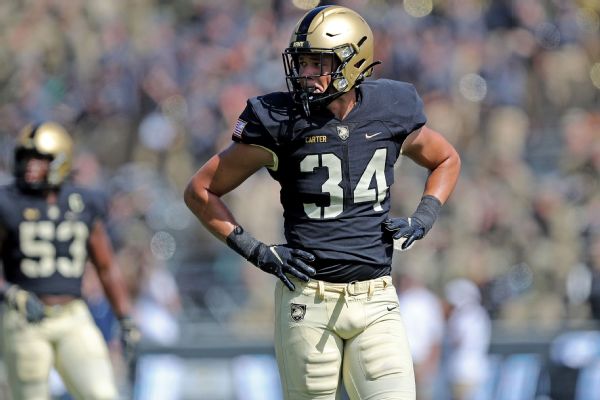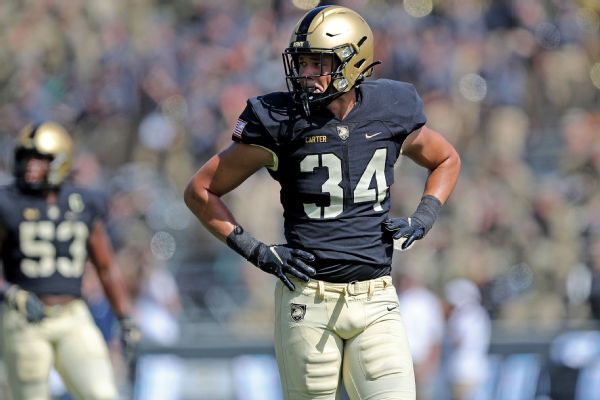
A sudden potential roadblock has emerged that could prevent Army star linebacker Andre Carter II and other talented athletes at service academies from playing professional sports directly out of school.
The Military Times reported on Dec. 8 that a potential change in the policy for athletes at the academies emerged as part of a bill being passed through Congress. Since 2019, athletes at military academies have had the ability to apply for a waiver to delay their active service requirement and immediately pursue professional sports opportunities.
That rule, pushed through by former President Donald Trump in 2019, appears on the cusp of being revoked. Tucked in Section 553 of the National Defense Authorization Act, which passed the Senate on Thursday and is headed to President Joe Biden’s desk, is language that states an “agreement by a cadet or midshipman to play professional sport constitutes a breach of service obligation.” The bill covers the Army, Navy and Air Force and states: “The cadet may not obtain employment, including as a professional athlete, until after completing the cadet’s commissioned service obligation.” That obligation is, according to Army, five years of active duty and three years in the individual ready reserve.
The change is expected to take place when the bill is signed, which could be as early as next week.
The amendment was introduced by Mike Gallagher, a Republican congressman from Wisconsin’s eighth district. Late Friday, just over a week after The Military Times report was published, Gallagher’s spokesperson offered an update in which Gallagher acknowledged that current athletes at the academies “signed up with the understanding that they could apply for a waiver to defer their military service.”
Gallagher said in a statement to ESPN: “I will be working with my colleagues to identify a legislative fix that addresses this issue by grandfathering in existing athletes into the current system.”
Gallagher added that he still believes generally in his stance: “U.S. military service academies exist to produce warfighters, not professional athletes.”
Heading into this season, Carter’s NFL draft potential was one of the feel-good stories in college football. The Black Knights star is Mel Kiper’s No. 22-ranked player for the upcoming draft, a stunning development for a school that hasn’t had a first-round pick since 1947 and has had only two players drafted since 1969.
Carter chose to stay at Army his final two seasons out of loyalty, despite being a player whose talent could command a large sum of money on the name, image and likeness market. He’s 6-foot-7, 260 pounds, and talented enough to play at any blue-blood school. His family says transferring was never a serious consideration, not even after Carter led the country in sacks in 2021 with 1.19 per game. (He finished ahead of Will Anderson Jr., the Alabama outside linebacker who is the only OLB ranked ahead of him in Kiper’s draft rankings.)
After two years at the academy, all cadets going into their junior year “affirm” with the school, an agreement to both serve after graduation and pay back any tuition costs if they don’t graduate. If Carter went back on his affirmation, that would mean both not graduating after such rigorous work for nearly four years and an expensive bill to pay back.
Last Thursday, as Carter’s parents were traveling from their Houston-area home to the Army-Navy game, they learned about this potential change on Twitter. They were blindsided when reading the Military Times report on the contents of the bill. Their son’s plans to enter the draft, play professional football and later serve in the military had potentially been upended.
“Here’s the thing that’s so painful,” Melissa Carter told ESPN, before Gallagher issued his statement indicating he would seek a legacy exception that would apply to Carter and other current athletes at service academies. “You guide your son to do the right things because it’s right. And it’s really disappointing that it’s not reciprocated. This has been his goal since childhood, to go into the NFL. Every step of the way, that was on track, until we saw this article. That’s the part that’s disappointing. It’s not surprising to see so many people transfer, opt out or switch teams. When loyalty is not reciprocated, that stings.”
Army coach Jeff Monken didn’t find out about the potential rule change until after the Army-Navy game Saturday.
“It’s just kind of pulling the rug out from under him,” Monken told ESPN. “It’s not fair. It’s not fair to him. He was loyal to this team and institution. He could have left and he didn’t. He still wants to serve. It’s not that he doesn’t want to serve. He wants to pursue the NFL and play, and then serve.
“I’m 100 percent against it.”
Melissa Carter said it’s her “understanding” that her son will have to do two years of military service if the bill gets passed as written. (Army officials explained that after two years of active service, a graduate can apply for an alternative service option.) Melissa Carter said the bill’s passage — depending on the final form it takes — could force her son to choose between two goals: graduating from the United States Military Academy or playing professional football. The family doesn’t have animosity toward Army or the coaches but more against the apparent political whims that have left their son at a crossroads.
If Carter does go No. 22, he’d get a contract for roughly $15 million. Although he’s projected in the first round in some mock drafts, some scouts believe he’s more of a second-round pick. Regardless of the potential payout, the family says there’s a lack of fairness that the rules would suddenly change days before their son played his final regular-season game. If the rules had been different, his path likely would have been different. The Carters asked about the rules frequently during their son’s final two years.
In his comments in the committee debate, Gallagher, a former U.S. Marine, explained it this way: “When a midshipman or a cadet opts to put off their service obligation to pursue a career as a professional athlete, in effect, it means they removed an opportunity from an individual who is committed to carrying out their service obligation immediately following graduation.
“My amendment would prohibit that. It would require them to fulfill their obligation prior to going pro for whatever sport. We’re talking about average acceptance rates of about 10% at these service academies. So that means there are thousands of patriotic Americans who do not have the opportunity to attend a military service academy.”
The former secretary of the Army, Ryan McCarthy, who was part of initiating the policy that allowed deferment back in 2019, said he’s unsure of the mechanics of how this section got into the current bill that’s been passed.
McCarthy didn’t find out about the potential change until he attended the Army-Navy game Saturday.
McCarthy said he’s disappointed because there’s proof that the deferments work and because NFL executives had finally became comfortable drafting players from the academies. McCarthy highlighted the decades-long philosophical debate in the military on whether to let athletes defer service to play. He said it winds through famous Navy graduates such as David Robinson in the NBA and Napoleon McCallum in the NFL.
“You can argue on the merits of philosophy,” McCarthy told ESPN. “It’s the sort of thing where we have three-plus years of precedent. There’s five former Army players who have had service deferred. Four made it in the NFL and one, who was cut (First Lt. Connor Slomka), who is today in the 75th Ranger regiment. At present, the policy is working.
“Clearly these young men entered this season with the presumption they’d be afforded the opportunity, if able, to vie for the NFL. Because of this change, I think it’s only appropriate that the men who came to Army since the policy was initiated in 2019 should be grandfathered into the existing policy.”
There are four Army graduates in the NFL right now — Cole Christiansen (Chiefs), Brett Toth (Eagles), Elijah Riley (Steelers) and Jon Rhattigan (Seahawks). West Point is a crucial part of the story they tell. Monken doesn’t understand why Army graduates who train for the Olympics through the World Class Athlete program are celebrated and those who choose to delay service for professional football are blocked.
“We’re so proud of these guys and how they represent West Point,” Monken said.
Andre Carter II declined to speak to ESPN for this story. But his family made his emotions clear.
“He’s so upset,” his father, Andre, said. “He was literally, visually upset because of the uncertainty. He was not happy. When you’re in the military, everything is precise. To have something at the eleventh hour kind of thrown out there when you are so used to having a regiment; he’s in a fog about the whole thing.”
ESPN’s Tisha Thompson contributed to this report.










